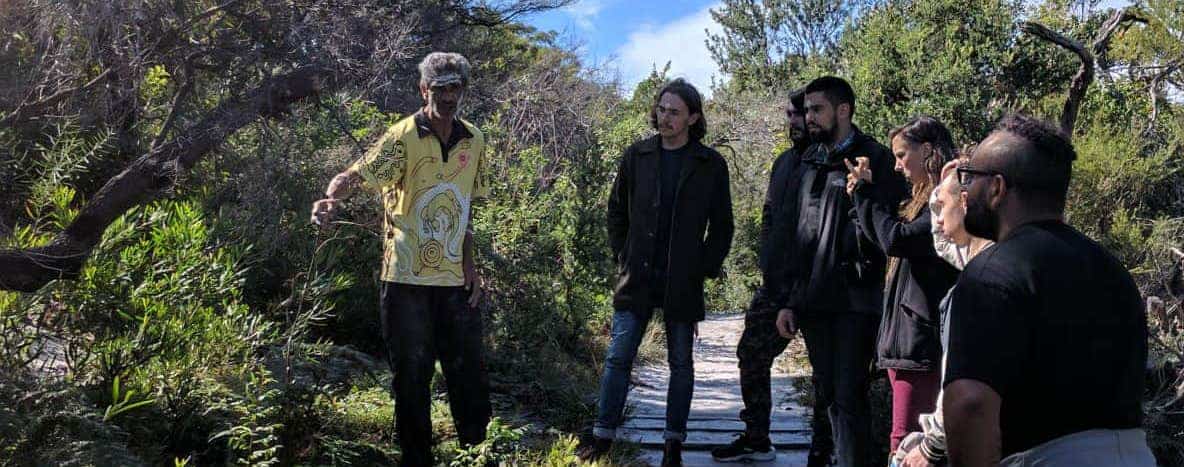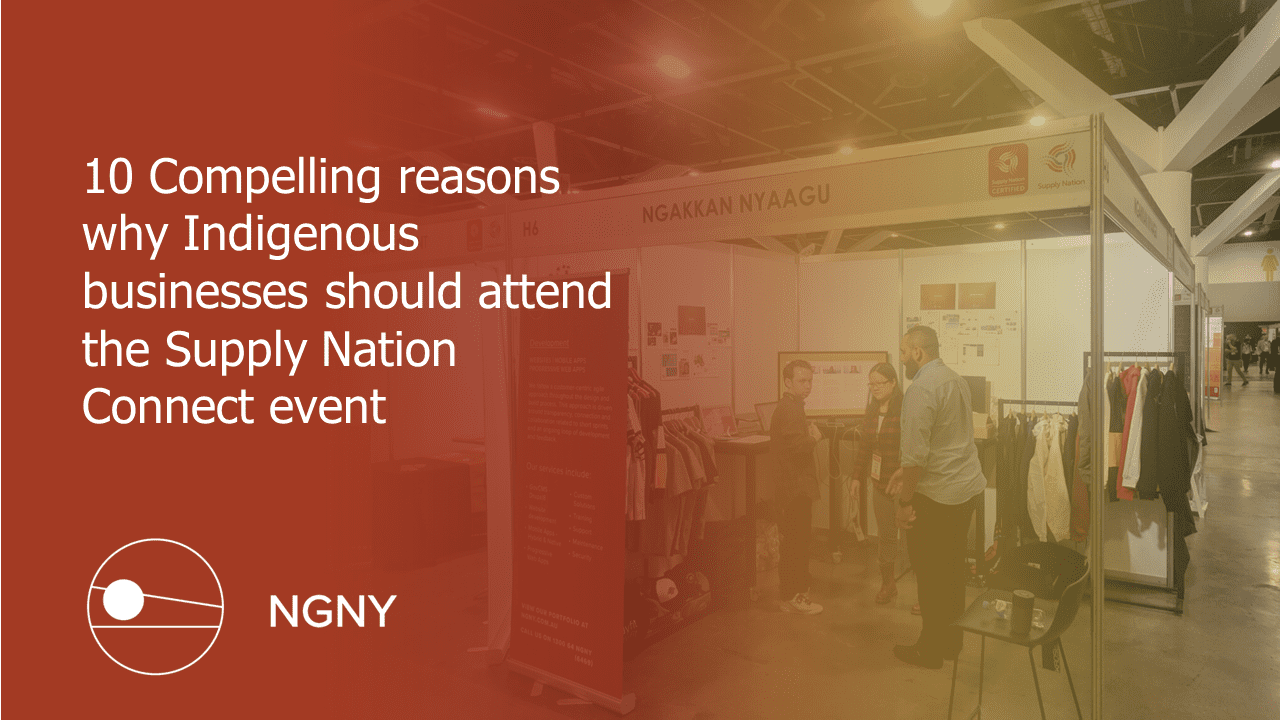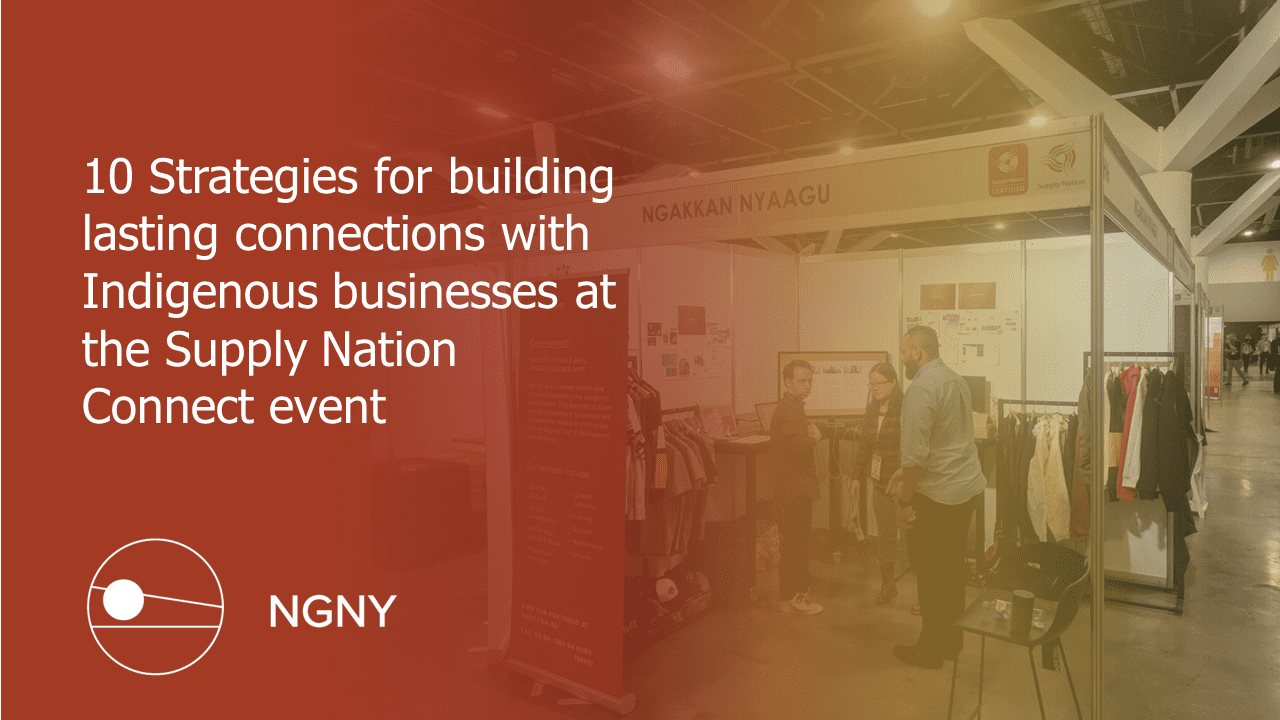
In case you are new to NGNY, let me introduce us. My name is Liam Ridgeway (Gumbaynggirr and Wakka Wakka) and I’m the co-founder of Ngakkan Nyaagu (NGNY) with John Saulo (Gunditjmara and Wemba Wemba). NGNY is a 100% Aboriginal owned digital agency based in Sydney. We develop websites and mobile apps and provide website hosting, graphic design and related peripheral services in digital and print media.
John and I established NGNY in the middle of 2014 with a $300 dollar contract plus our hopes and dreams for the world in our sights and minds. Not everything we set out to do has gone according to plan, but we’ve learnt a huge amount along the way. We have a raft of recommendations and insights about the challenges and successes of running our business which we’d like to share with aspiring Indigenous business owners.
Why did we set up our business – NGNY?
Coincidentally back in 2014, John and I were both freelancing on different digital-based projects and we saw an opportunity where we could pool our knowledge, skills, networks and similar aspirations to establish a 100% owned Aboriginal business. I had worked in the corporate tech industry for several years and this was my second tech-based business at the time. John had a background in retail as the co-owner of a retail business where he’d honed his digital skills and knowledge as the key person looking after both e-commerce and digital marketing requirements. John and I realised that our combined value of over a decade’s worth of experience in the tech industry would be a great foundation for a thriving business. And NGNY was born. Five years on, between us, we have approximately 20 years experience working in this industry.
When we established NGNY, we looked at how we could build a business that could also work with and service our community (i.e. the Aboriginal and Torres Strait Islander communities). Gradually our business was also able to service projects for non-Indigenous organisations, enterprises and government. For us, this was a critical journey to get runs on the board, build our credibility and reputation as an Indigenous digital business and demonstrate our experience and expertise through our growing portfolio of work. In fact, when we started NGNY, the Indigenous Procurement Policy (IPP) did not even exist, so we were not in the market to service projects and opportunities under the IPP. We worked hard to attract and win business based on our merit – irrespective of government quotas.
Whether you are a budding or established Indigenous business, here are a couple of critical questions that you should ask yourselves:
1. If the Indigenous Procurement Policy (IPP) did not exist tomorrow would you continue to operate as a business?
Many businesses have popped up as a result of seeking to win Federal and State government projects based purely on this policy. You need to ensure that your business is sustainable regardless and that you appeal to a broad client base.
2. What is your business doing to invest back into the Indigenous economy?
Most critically, what are you doing with your businesses, skills and knowledge to work with Indigenous organisations and Indigenous communities?
As Indigenous business owners, we believe it’s critical for the future economic growth and sustainability of our community to engage the Indigenous supply chain as well as investing directly back into the community. When we talk about investing back into the community we’re talking about investing in outcomes and not just outputs.
Outputs can be measured in terms of looking to employ Indigenous people in your business and/or the number of Indigenous businesses with which you engage and procure products and services from. These are great outputs, but they’re only a starting point.
Outcomes look at measuring the impact of these actions and understanding how you sustainably impact Indigenous individuals, their families and their communities. As Indigenous business owners we should all be leading the way, setting an example in how we conduct ourselves in this scenario.
3. Does the market actually need your product or service? Are you entering a crowded space where there are a lot of similar businesses already?
These are critical questions. If you want to set up a business in an already crowded space, it will be much harder to win projects because you are competing on what eventually could be perceived as a commoditized product or service. Unless, of course, your product or service is very niche within that crowded market space.
At NGNY, we’re very passionate about Indigenous business owners supporting, engaging and investing back into our community for future sustainability and not just seeking short-term gains. Yes, we want Indigenous businesses to succeed and be financially prosperous, but we want this to be sustainable for our entire community now and into the future.
We believe that it’s critical to bring our people along on this journey with us as opposed to being an individual success story. It’s essentially Economics 101 : if we’re supporting and investing in each other and the Indigenous economy then we are growing and strengthening our foundations. And, subsequently, we’re also growing our own individual opportunities of sustainable success because the economy in which we invest will return the favour. But, if we’re not doing this, then we’re leaking money out of our economy, and this is not sustainable for the economic opportunity of our people.
Some more questions to consider:
1. Do you know your Why? and is your Why? strong enough for you to remain resilient in your business if things become tough and challenging?
John and I had a strong understanding of our Why? when we formed NGNY, and our Why? has evolved as we have progressed the business and picked up more knowledge and experience. Our Why? started off with being able to service Indigenous organisations which were being ripped off by other IT service providers, and this was based upon the feedback that we’d gathered over many months of engagement. We really wanted to focus on supporting Indigenous organisations to understand and own their digital assets (i.e. their websites, images, apps, etc). Today, we still hold this mantra, but we’ve also grown our Why? to encompass a concept we’ve coined the Indigenous Digital Economy. The Indigenous Digital Economy is the way in which we look at and understand how we can use technology to enhance community productivity which drives sustainable and transparent Indigenous outputs and outcomes. At NGNY, we know our narrative, our purpose and what motivates us to maintain momentum through the good times and push harder through the challenging times.
2. Do you know your numbers and have a high level plan?
Whilst you may not have direct numbers on which to base your research, it’s important to understand who your market is, the potential size of your market and how much of the market you can gain. Yes, this might be speculative, but it’s a starting point for you to start planning on the possible size of your market and how you are going to capture some of this market. For example, we conduct secondary market research based on statistics available online and then we use this as a baseline for how we think we can capture a portion of this market and whether this portion is enough for us to pursue the business opportunity.
We recommend also doing a lean business model canvas. This is a high level business plan that can be used to kick start your thinking around your initial ideas and then validating these, without the need to spend countless hours on a business plan.
3. How can you prepare to start your own business?
When you start your own business you need to be aware that your product or service is only half of what you need to do to start and maintain a business. Things like accounting, legal, HR (if you are employing or contracting people) and day-to-day operational requirements should be understood. You don’t necessarily need to have all the answers up front, but keep in mind and be prepared that at some point you will need to address these requirements. And there are specialists and experts who can assist you with these requirements. Check out registering with Supply Nation which includes access to a great directory for Indigenous businesses which can assist you with these requirements. Also, your local Indigenous Chamber of Commerce can provide guidance and assistance.
In summary, our recommendations:
- Know your Why?.
- Know your business narrative and why you exist.
- Understand whether the product or service that you want to establish is in a crowded market space. And, if so, understand what makes yours unique compared to already established businesses. This is not to discourage you from establishing your business, it’s for you to understand that in a crowded market place it’s harder to win contracts unless what you offer is unique and sets you apart from competitors. If you don’t have a significant point of difference, then all you end up doing is competing on price and this can often lead to financial issues for your business and your market segment.
- Do a lean business model canvas to understand your purpose and a high level view of your business plan.
- Understand your numbers i.e. do your market research, how you plan to go-to- market and then your forecasts. Your forecast will help you set up a plan of attack – what you are targeting and how you will target it.
- Be prepared to learn and understand things that you didn’t think of before setting up a business i.e. accounting, finance, legal and contracts and sometimes HR.
- Consider your eligibility under the Indigenous Procurement Policy – see how we engaged with the IPP
- But also look beyond government contracts (i.e. IPP) to become a sustainable business that services and benefits our wider community. And don’t think just because you are an Indigenous business, that you have the right to win a government contract overnight. You have to get runs on the board and demonstrate to government that you are a reputable business, with a solid track record and not a risky investment.
- Consider the benefits of certification with Supply Nation and attending and participating in the annual Supply Nation Connect event to network and increase your exposure as an Indigenous business
- If you haven’t already – check out membership of your local Indigenous Chamber of Commerce (ICC). Being Sydney-based we are an NSWICC Assured business which has given valuable networking opportunities with other Indigenous businesses and another source of advice and support. And also a chance to help other businesses.
- Don’t just be an Indigenous business nor allow yourself to be pigeon-holed to only work on Indigenous projects. Be a business that becomes known for delivering amazing products and services and the fact that you are an Indigenous business – is a bonus!
- Once you’ve been established for a while, you could also consider becoming a certified B-Corporation which demonstrates your core values and authenticity on a national and global stage. We were very proud to gain recognition as a certified B-Corporation in 2018.
The above recommendations are things that we’ve discovered over our journey as an Indigenous business over the last 5 years and also what we’ve witnessed and learnt from other Indigenous businesses.
Please connect with us if you have any questions about this article. We know that there are a lot of people in our community wanting to set up businesses and we’re hoping to see this growth become sustainable and impactful for our people and the Indigenous economy.




